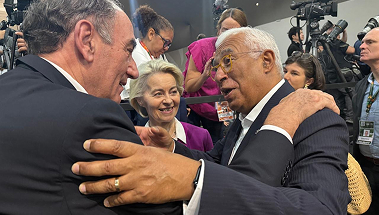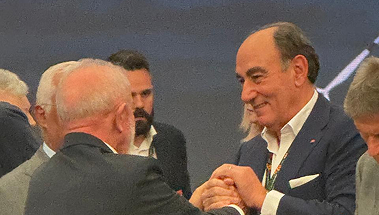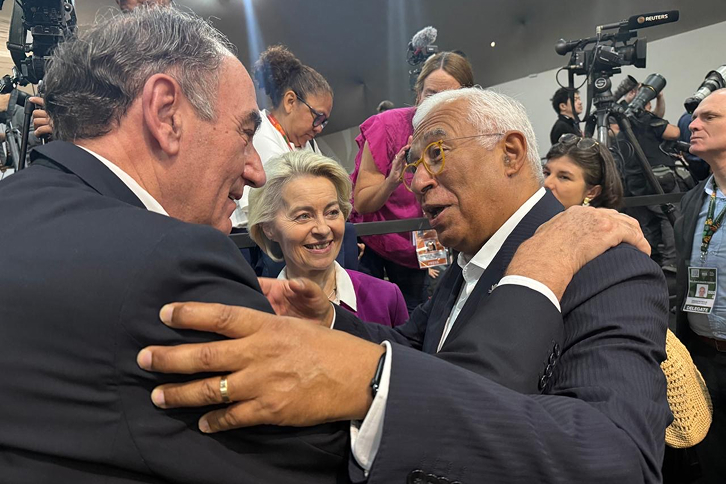COP30: 2025 Climate Change Conference
Iberdrola at the UN climate change conference in Belém
The 30th United Nations Climate Change Conference, better known as COP30, was held between 10 and 21 November 2025 in Belém, in the state of Pará (Brazil). For the first time, the world's most important climate summit took place in the heart of the Brazilian Amazon, the largest rainforest on the planet and one of the main carbon sinks. Once again, Iberdrola participated in the COP, highlighting the need to promote electrification, the development of energy storage and electricity grids to achieve a sustainable future.
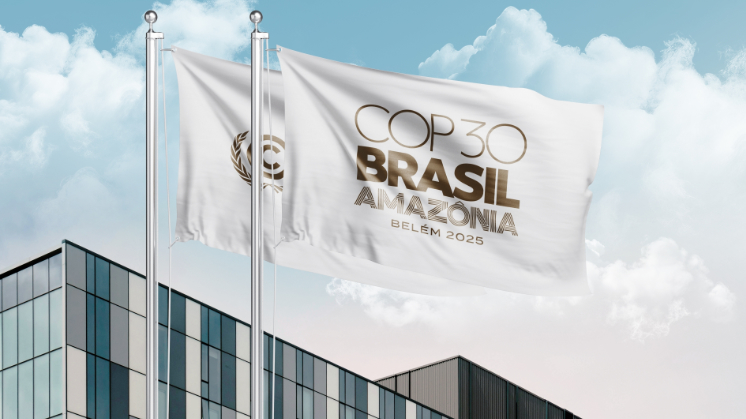
The city of Belém, in Brazil, will open its doors to the world as host of COP30 from 10 to 21 November 2025. Located at the mouth of the Amazon River and known as the main gateway to the vast Amazon region, Belém is not just a symbolic setting: it is a statement of intent. This climate summit is set to be a space for urgent dialogue, bringing together states, organisations and voices from civil society to agree on concrete commitments in response to the climate crisis.
In a year marking 20 years since the Kyoto Protocol entered into force and a decade since the signing of the Paris Agreement, COP30 underlines the need to move from words to action, to renew political will and to strengthen multilateralism as the only way to build a more sustainable future. The summit brings together representatives of civil society, businesses and governments from more than 190 countries.
 COP30 Brasil Amazônia
COP30 Brasil Amazônia Enlace externo, se abre en ventana nueva.
Enlace externo, se abre en ventana nueva.
 UNFCCC: UN Climate Change Conference
UNFCCC: UN Climate Change Conference Enlace externo, se abre en ventana nueva.
Enlace externo, se abre en ventana nueva.
COP30 conclusions
The strong high-level political presence at COP30 demonstrated that multilateralism remains alive despite a complex geopolitical context. Among the main agreements reached were:
Iberdrola at the COP30
Iberdrola Chairman Ignacio Galán took part in the summit of heads of state and government convened by Brazilian President Lula da Silva on the occasion of COP30, which is being held in Belém. The meeting, which brings together leaders from countries such as Germany, France and the United Kingdom, as well as senior international representatives, addressed the main challenges of the energy transition. Ignacio Galán defended the role of investment in electricity grids, the expansion of renewable energies and the promotion of storage as a tool to strengthen energy security and autonomy, generate opportunities for growth, employment and industry and, of course, advance in the fulfilment of climate objectives.
In addition, Iberdrola participated in the main events on electrification organised for COP30, one of them led by the We Mean Business Coalition (the leading global business climate organisation) and another organised in collaboration with the Presidency of the climate summit.
COP30: goals and priorities
COP30 sought to mobilise the world under the inspiration of the mutirão (motirõ in Tupi-Guarani), a term used by Brazil’s native indigenous peoples. This concept refers to “a community that comes together to work on a shared task, whether harvesting, building or supporting one another”, as described in his First Letter External link, opens in new window. to the Parties by André Corrêa do Lago, president of COP30 and secretary for Climate, Energy and Environment at Brazil’s Ministry of Foreign Affairs. This summit called on the world to unite around a common cause: working together to tackle climate change.
External link, opens in new window. to the Parties by André Corrêa do Lago, president of COP30 and secretary for Climate, Energy and Environment at Brazil’s Ministry of Foreign Affairs. This summit called on the world to unite around a common cause: working together to tackle climate change.
Among the main objectives were:
The COP30 Action Agenda was the framework of commitments and actions by civil society, businesses and governments to accelerate climate action. It was structured around six key thematic areas:
Transition in the energy, industry and transport sectors
This involves tripling renewable energy capacity and doubling energy efficiency, accelerating zero- and low-emission technologies in hard-to-abate sectors, ensuring universal access to energy and moving towards the equitable phase-out of fossil fuels.
Sustainable management of forests, oceans and biodiversity
This entails investing in efforts to halt and reverse deforestation and forest degradation, and promoting initiatives to protect and restore ecosystems, in particular the oceans.
Transformation of agriculture and food systems
This focuses on restoring degraded land, promoting sustainable agriculture, building resilient and sustainable food systems, and ensuring equitable access to adequate nutrition for all.
Building resilience in cities, infrastructure and water
This requires strengthening key areas such as multilevel governance, sustainable and resilient buildings, resilient urban development, mobility and infrastructure, as well as the management of water and solid waste.
Promoting human and social development
Through the promotion of resilient healthcare services; the reduction of climate change impacts on hunger and poverty eradication; education and job creation; and the protection of culture and cultural heritage.
Catalysts and accelerators, including finance, technology and capacity-building
This cross-cutting area applies to all the others. It highlights the importance of driving climate and sustainable finance, harmonising carbon markets and accounting standards, reducing non-CO2 gases, fostering climate innovation and strengthening governance.

International agreements
25 years of searching for consensus on the fight against climate change.

Origin of the COP
Why are there different POPs and what is their history? Find out!
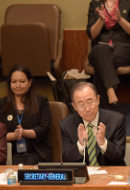
Paris Agreement
Find out what this agreement is about, what are its key points and which countries are part of it.

Climate change
Leading the fight against climate change.
COP29, the predecessor
This edition follows COP29, held in 2024 in Baku, Azerbaijan, where key agreements were reached, including a New Collective Quantified Goal on Climate Finance (NCQG) to support developing countries and a pact on the rules for carbon credit transaction and project markets, among others.
The Iberdrola Group took part in COP29 in line with our commitment to a sustainable energy model that creates opportunities. Through our participation in more than 20 events, we emphasised the need to develop the infrastructure required to address the potential consequences of climate change, with the promotion of energy storage and the expansion of electricity grids as key priorities.









